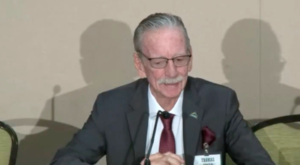The 2023 Retiree Summit at Bear Mountain Inn included an engaging panel on the various workplace health and safety situations countless retirees faced during their working years.
The panel was moderated by BellTel Board member Tom Butler, with panelists including BellTel Chair Thomas Steed, DuPont Retiree Association’s Carol Knotts, and GE Retirees Benefit Solutions President John Phelps.
Each panelist shared their unique industry and work experience with occupational health and safety (OSHA) concerns during their working years, as well as how, or even if, their former employers were proactive in protecting their employees from harm.
BellTel Chairman Thomas Steed spoke of being present at the 1975 NY Telephone Fire and his direct exposure to airborne PCBs released into the air from billions of feet of burnt telephone cabling.
Steed told of the fire burning for two days.
“The building smelled so toxic. [The melting plastic] was in your nostrils, when you left at the end of the day, I would blow my nose and two rivulets of black would come out into my handkerchief. That’s how thick the soot and everything was in the building.”

When asked what kind of personal safety gear he and other workers were provided for this urgent restoration work, dubbed the “Miracle on Second Avenue,” Steed replied, “We had rubber manhole boots, rain jackets, hard hats, safety glasses, and gloves, but no respiratory protection.”
He addressed the latency period on cancers and other illnesses that might not affect the workers until years after their exposure.
“The NY City Fire Department did their job, they put the fire out. The Ma Bell employees did their job for over a half a year rebuilding the switching station’s infrastructure. The corporate and municipal lawyers did their job by ignoring our exposure.”
Carol Knotts, who spent her career at DuPont, spoke of several toxic exposures she experienced.
Knotts worked in the Teflon and coatings division for over 20 years. Teflon coating is made of PFOAs, which are now linked to possible testicular, kidney, and thyroid cancers.
Her team was housed in a space called The Annex. Every day, for many months, a staff of over 50 DuPont employees would arrive in the office and each would have a fresh coating of black “soot” on their desks. The company informed them that it was black mold.
At age 35, she came down with a heart valve problem connected to exposure to mold. All her colleagues developed serious and permanent asthma and allergies, with regular nose bleeds, and Carol completely lost her sense of smell.
In response to staff concerns, the company moved them to a new building and only offered to pay for allergy medication.
“Many people are effected by what companies do, and it’s not ethical, and it just hurts even more when they do things and don’t take care of the employees, even after knowingly affecting their health.”
John Phelps worked for four decades at a General Electric Silicone plant in Waterford, NY, and, along with over 1,000 others there, was exposed to countless toxins, developing negative health effects including asbestos exposure.

Later, in 2006, the GE division was acquired by Apollo Global Management and renamed Momentive Performance Materials.
He told of a building at their worksite nicknamed the “Black Hole” because people would go in and never come out because the vinyl chlorides present inside would likely kill them. The site was eventually forced to shut down when OSHA began in the early 1970s.
“I used to jokingly say that the GE plant makes Love Canal look like a picnic,” Phelps said. “When they dug up the ground, solvents would come out of the ground, and it was all over the place.”
Phelps said among the many toxic solvents his group worked with, one was Trichloroethylene (TCE) – which is used in many cleaning products, but long-term exposure to TCE can cause liver damage. They used it to make GE silicone products and were told it was safe to use to clean the control room floors and for tools and equipment. While using TCE, workers did not have access to any personal protective gear.
Phelps said, “A lot of these people, they gave their lives to that plant and then [GE] took away that healthcare.”
The common thread between all the stories was the utter lack of employer support and failure post-retirement to acknowledge the real and terrifying health effects on the workforce for simply and loyally doing their jobs.